Harassed by palm oil company, Thai village defends land
Villagers of Klong Sai Pattana say palm oil company responsible for targeted killings and harassment of their community.
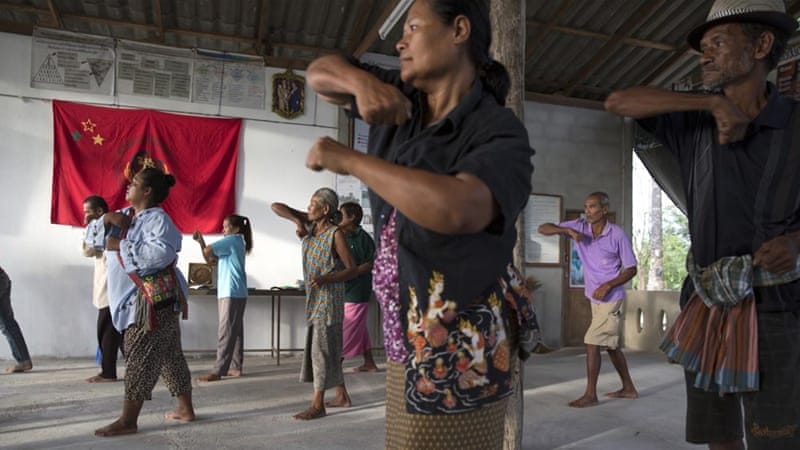
Chai Buri District, Thailand - As he manoeuvred his pick-up truck along the dirt track leading to his village of Klong Sai Pattana one afternoon, Supot Kalasong, 42, heard
a loud bang. He had been driving home after getting an oil-change in a
nearby town and for a split second, he thought one of his tyres had
exploded, burst by one of the sharp rocks on the path.
But when a man wielding a gun leapt from a ditch on the right side of
the car, he realised someone was trying to kill him. "It wasn't until
the second bullet was fired that I realised it was gunfire," Kalasong
said a few months after the attack.
"I tried to get away to the left side and was shot in the leg twice. I
then tried to grab the radio walkie-talkie to call for help from our
security team, but he kept firing until the fifth bullet went into my
arm," recalls Kalasong of the incident that took place on April 8, 2016,
in Surat Thani Province in southern Thailand.
Kalasong would have been killed had it not been for two villagers
who, upon hearing the shots, ran down the hill towards the car less than
200 metres away. Spooked by their approach, the gunman fled into the
dense undergrowth of a palm oil plantation. Kalasong was taken to a
hospital in the provincial capital, returning to the village 12 days
later to recover.
On that day, remarkably, he survived. Four other villagers from
the Klong Sai Pattana community, however, were not quite as lucky.
 |
| Supot Kalasong's car showing bullet holes after an attempt was made on his life [Al Jazeera] |
The investigation
Since 2008, this community of around 70 families have been embroiled
in a conflict with a palm oil company that locals believe is behind the
violence.
For decades the palm oil company Jiew Kang Jue Pattana Co Ltd has illegally occupied and cultivated palm oil trees on a 535-acre plot of land in the Chai Buri District of Surat Thani Province.
The company operated with no official legal documentation or land
concession, until the Southern Peasant's Federation of Thailand (SPFT)
began investigating them and collecting evidence.
The SPFT was officially registered in 2008 but its founding
members have long been fighting for land reforms in Surat Thani
Province. The organisation works on behalf of landless farmers,
identifying expropriated land owned by the state that can be made
available for living and cultivation.
It reported its findings about the palm oil company to the Agricultural Land Reform Organisation (ALRO), a government agency in Surat Thani, which then took legal action against the company in 2005, suing them for illegal trespassing and land encroachment.
The ALRO won this case in the provincial court in 2007, but the palm
oil company appealed the verdict continuously. In 2014, the ALRO
resolutely won the case when a final decision was handed down by the
Supreme Court in Bangkok.
But, even in 2008, after the successful resolution of the initial
court case, hundreds of landless farmers under the supervision of the
SPFT settled on a 26-hectare part of this land - building ramshackle
houses from wood and growing small crops.
In May 2010, Prime Minister Abhisit Vejjajiva's cabinet passed a
regulation on the Issuance of Community Land Title Deeds and
the community has been expecting to receive a land title deed since
then.
This cabinet resolution set up a community land title deed programme
which offers land use documents to entire communities as part of the
government's broad strategy to help reduce income disparity within the
society. But the people of Klong Sai Pattana have yet to receive a
deed.
 |
| Supot Kalasong works in the communal meeting hall preparing documents to submit to government agencies [Luke Duggleby/Al Jazeera] |
No backing down
The community has refused to succumb to intimidation and be forced
off the land despite continuous opposition to their presence through
ongoing violence from what they believe to be people hired by the palm
oil company.
Prateep Rakangthong, 62, has lived in the village since its
establishment in 2008. "I asked the villagers whether they want to stay
and fight for our right to be here. Most said they had nowhere else to
go," explains Rakangthong, a respected figure in the village and
committee member of SPFT.
"The first month I moved here, I could hear gunfire every night. They
were firing bullets into our village at night-time," he recalls,
sitting in the pavilion in the centre of the village often used for
meetings.
What began as intimidating warning tactics ultimately resulted in the
fatal shooting of their first community member, Somporn Pattaphum, in
2010.
"In 2010, the influential group of investors tried to drive us
out the area by using tractors to destroy our houses," Rakangthong says,
referring to the palm oil company. "One of our members was shot dead.
Some villagers left while some wanted to stay and fight back."
Other deaths followed. In 2012, Montha Chukaew, 54, and Pranee
Boonrat, 50, were found shot dead. The two women were found a few
minutes away from the entrance of the village, at the edge of a palm oil
plantation surrounded by assault rifle bullet cases. In 2015, another
villager, Chai Bungtonglek was found shot dead outside his family home.
 |
|
| Signs asking for land rights dot the area during the memorial day of Klong Sai Pattana village in remembrance for each of the four people murdered during their prolonged fight to remain on the land [Luke Duggleby/Al Jazeera] |
The gunman, who was arrested but later released for the alleged
murder of Bungtonglek, has since also been arrested for the attempted
murder of Kalasong, but was acquitted by the Surat Thani Provincial
Court for lack of evidence in February 2016.
"When we visited the community in 2010, we went there to represent
the Rights and Liberties Protection Department (RLPD) because we'd
received complaints about people being killed and property being
damaged," explains Nongporn Roongpetchwong, deputy director general of
the Rights and Liberties Protection Department under the Ministry of
Justice in Bangkok.
"I went there myself. It was very scary at that time. We saw the
conditions that they lived in," she explains in a meeting room inside
the sprawling government compound in northern Bangkok.
To date, however, no one has been held accountable for the
murders and acts of violence in Klong Sai Pattana, even though officials
in Bangkok are aware of the community's plight.
"In my personal opinion, in the case of human rights defenders in
Klong Sai Pattana community, it's still ambiguous because there's a
fight going on to take over the land that belongs to the government and
those individuals do not have the right and neither does the company,"
the deputy director general told Al Jazeera.
Pranom Somwong, the country representative of Protection International, a human rights
organisation, explained that they work "very hard to put recognition on
SPFT as a community-based human rights defender organisation. Because,
first of all, people are scared about assisting them, in part because
they have doubt about the occupation of the land and don't understand
the community land title issue," she says from her cramped Bangkok
office.
"At the beginning - diplomats, the media and others didn't dare go to
Klong Sai Pattana because of too many killings there. So we [Protection
International] affirm their legitimacy at the national and
international level, recognising SPFT as very rightful and inspirational
land rights defenders and eventually a delegation from the European
Union and Office of the High Commissioner for Human Rights of the United
Nations visited the community," she explains.
After numerous attempts, Al Jazeera was unable to reach the Jiew Kang
Jue Pattana Co Ltd using publicly available contact information for
comment on the numerous allegations brought by the organisations and
villagers.
 |
| Pratip Rakhungthong, 61, lights dried lemongrass grown in the village to keep away mosquito's [Luke Duggleby/Al Jazeera] |
Working with the community
Protection International is an international non-profit organisation
dedicated to the protection of human rights defenders and has worked
with the community since 2012. As well as supporting the community with
legal and security assistance, the organisation has worked to raise
awareness of their plight both within Thailand and outside.
"The first day, they [Ministry of Justice] went down they had lots of
questions and we felt they were still not understanding the issue. The
Ministry of Justice asked how SPFT could still be peacefully defending
their rights because there had been so many killings," Somwong says.
Faced with such violence and having received no assistance from the
government, the community has taken measures to protect themselves
peacefully and collectively.
"Since villagers were killed, we started to protect ourselves
rather than waiting for help from the government," Kalasong says. "The
security team has been arranged for everyone's safety. There's a rule
that no one can leave the village after 6pm until 7am the next day. It's
not safe to leave the village when it's dark. We all agreed on this
since the deaths of Ms Montha and Ms Pranee."
 |
|
| Every morning at 7am the villagers of Klong Sai Pattana meet, take roll call, talk about anything out of the ordinary the previous day, voice any grievances and do morning exercises. They understand that in such a prolonged and dangerous battle their strength is in their cohesion. The morning meetings, as well as monthly group projects, are aimed at keeping the community together and strong [Luke Duggleby/Al Jazeera] |
The village has four security posts constructed of sand bags and
wood, located at its four outer corners. Every villager - man or woman -
takes turns to man the posts in groups of three to four with rotating
shifts every 12 hours in order to ensure the posts are manned 24 hours a
day.
The only entrance for vehicles is closed at night to all traffic,
with the exception of emergencies.
Every vehicle that enters or leaves
is meticulously logged in books, recording the licence plate, date, time
and reason of entry. The more senior members of the community always
carry walkie-talkies and video cameras attached to the dashboards of
their pick-up trucks.
The community hold daily gatherings at 7am where they perform role
call, discuss anything out of the ordinary and voice grievances.
Everything is discussed and decided communally.
 |
|||
| Pitak Kongdi, 52, and other villagers on security duty get ready to sleep in a bunker built next to one of the security posts. Regularly unknown gunmen fire bullets in to the air and at the village from the darkness of the surrounding palm oil plantation. This specific security post sits a hundred metres away from one of the palm oil companies buildings and as a result, some members prefer to sleep in this large bunker they made [Luke Duggleby/Al Jazeera] |
Things are slowly improving for Klong Sai Pattana and there are signs
that the years of lobbying by the community, SPFT and other groups such
as Protection International and the UN High Human Rights Commission
(OHCHR), the Thai government is taking the threat against human rights
defenders and communities more seriously.
In 2013, the UN Special Rapporteur on Human Rights defenders stepped
in to raise the issue of Klong Sai Pattana with the Thai authorities.
The Ministry of Justice has been tasked with setting up so-called
"working groups" that puts focus on those at greatest risk. For these
groups, Klong Sai Pattana has been selected as the pilot case.
"The working group will focus on the protection of the community
leaders, whereas the Rights and Liberties Protection Department will
look at the human rights violations in accordance with our mission. From
this, the working group will be able to set up an organised model where
it can specify criteria of who human rights defenders are, how to
protect them and if there should be regulations to support them,"
Roongpetchwong says.
It remains to be seen whether the actions of these working groups can
prevent further violence towards the community, but they are hoping
that this path will ultimately lead to the universal recognition of
their right to live and farm at Klong Sai Pattana, something for which
they have fought for almost a decade.
Photo Gallery
 |
| Supot Kalasong, 42, leaves the village in a pick-up truck with his son to travel to Bangkok to submit a document to a government office. In April 2016, Mr Kansong was shot in six places by an assassin who had been waiting for him to drive past as he returned to the village. He remarkably survived [Luke Duggleby/Al Jazeera] |
 |
| Pratep Pasaja, 54, makes a radio test while being a security guard at one of the posts. Many villagers have walkie-talkies so they can communicate quickly if trouble arises. She will stay in the bunker all night until relieved by another team [Luke Duggleby/Al Jazeera] |
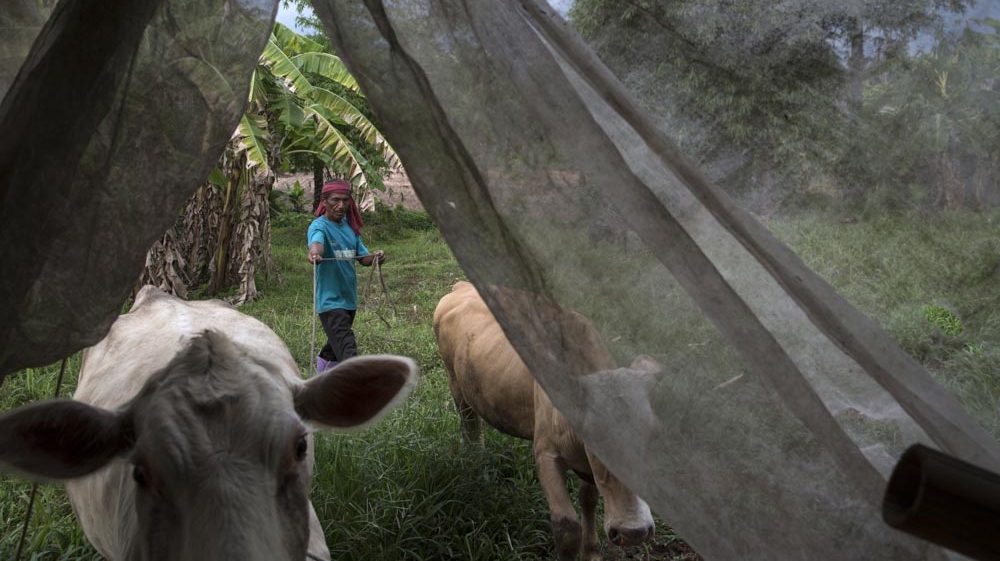 |
| Sukon Dongwun, 54, moves cows into their pen for the night. The cows are collectively owned by the villagers and people take it in turns to look after them. Any profits from the milk or meat will be divided among the community. A few years ago, keeping cows was impossible as the community was totally surrounded by palm oil plantations. However, gradually over time, the community has expanded its territories and turned small areas of palm oil plantations into farming areas, enough to rear cows [Luke Duggleby/Al Jazeera] |
 |
| Janya Ruangthong, 36, originally from neighbouring Krabi province prays in her house. Her family is one of five Muslim families living in Klong Sai Pattana. She left her home province for the opportunity to have a plot of land despite the danger. In the structure of the village, she is in charge of administration and preparing legal documents for officials and court appearances [Luke Duggleby/Al Jazeera] |
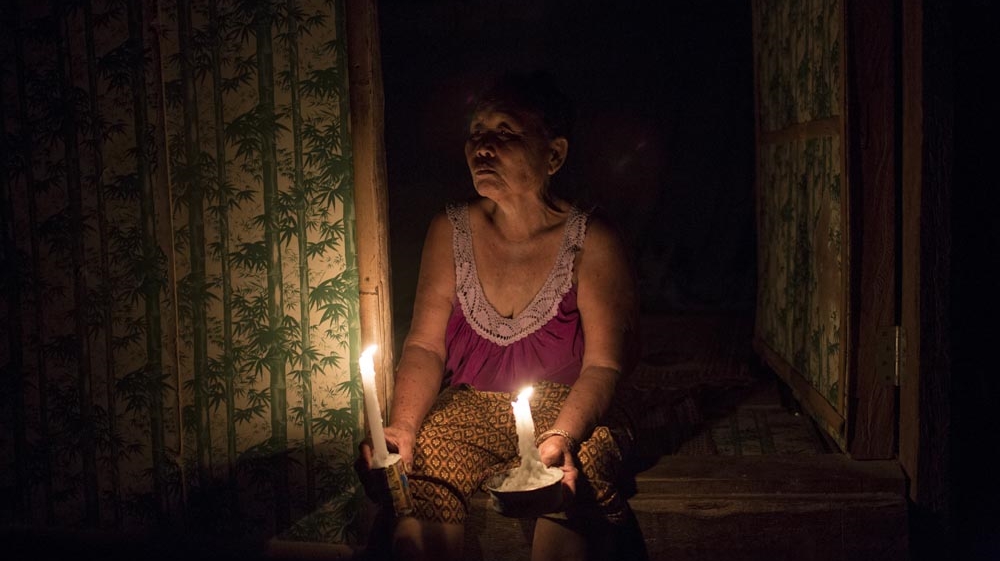 |
| Rattana Seli, 66, sits at the entrance to her hut holding two candles. The village has no electricity so at night mostly candles are used [Luke Duggleby/Al Jazeera] |
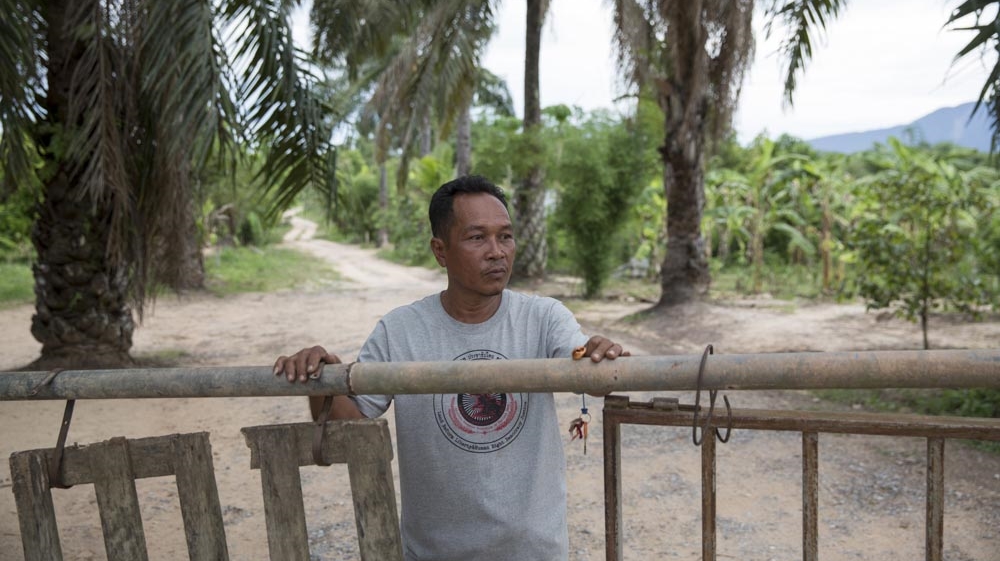 |
| Tawat Ruangsi, 48, stands at the main entrance and security post to Klong Sai Pattana village after having just closed the gate at 6pm. The village tries to limit the number of vehicles entering and leaving during the night and reopens at 6am. In total, the village has four security posts which are manned 24 hours a day by the villagers who take turns in small groups of three to four people [Luke Duggleby/Al Jazeera] |
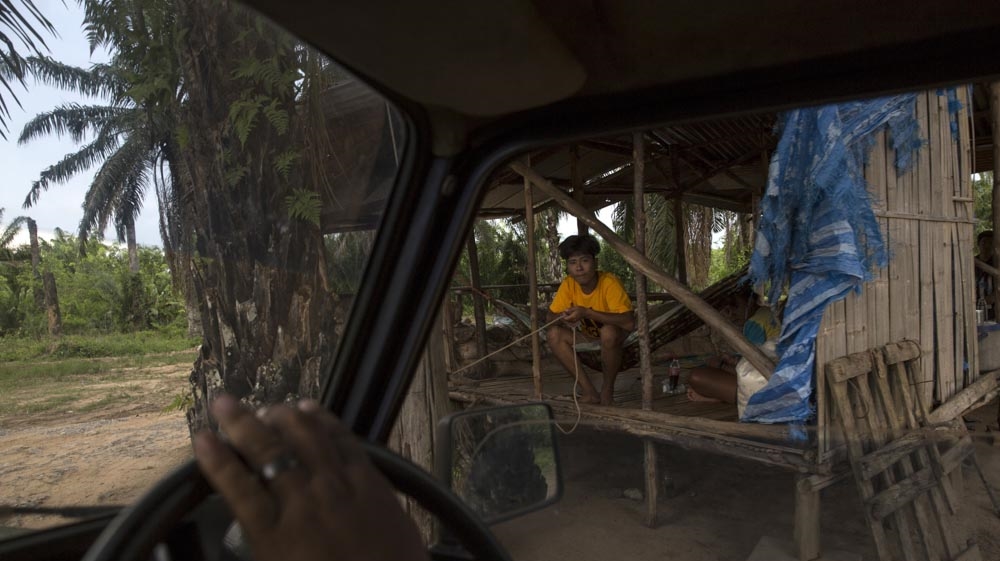 |
| A pick-up truck leaves the village as the security guard opens the guard post. All vehicles entering the village are documented in books noting the licence plate and time of entry and is used as evidence if something happens [Luke Duggleby/Al Jazeera] |
 |
| Pasit Bunban, 67, points to the boundaries of the communities land and the land of the expired land concession. [Luke Duggleby/Al Jazeera] |
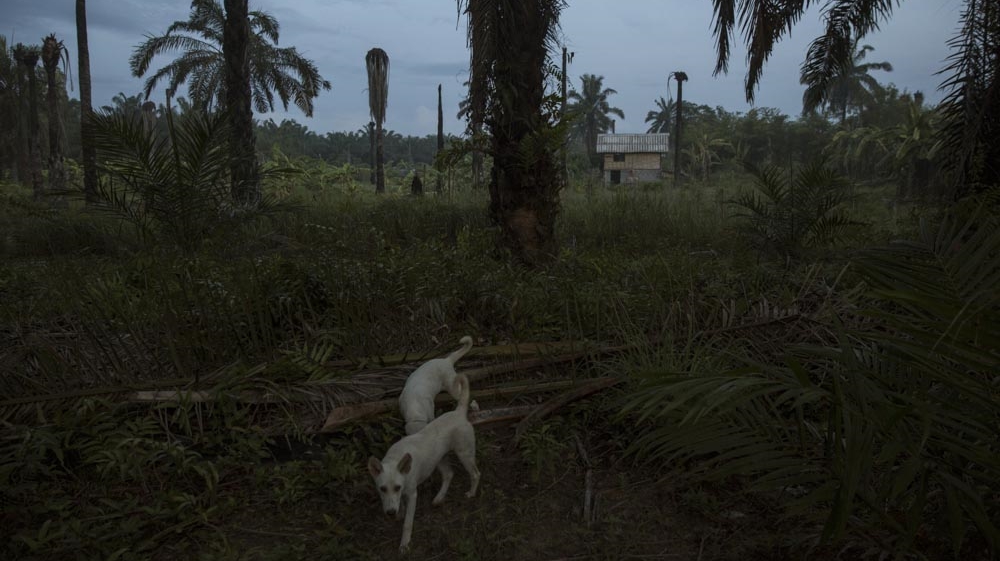 |
| A house in Klong Sai Pattana village stands in a clearing in what once was a palm oil plantation. While the land of the village has been cleared, the area is still surrounded by palm oil plantations. With no electricity, the village sits in darkness from dusk until dawn with the villagers rarely going outside for security reasons [Luke Duggleby/Al Jazeera] |
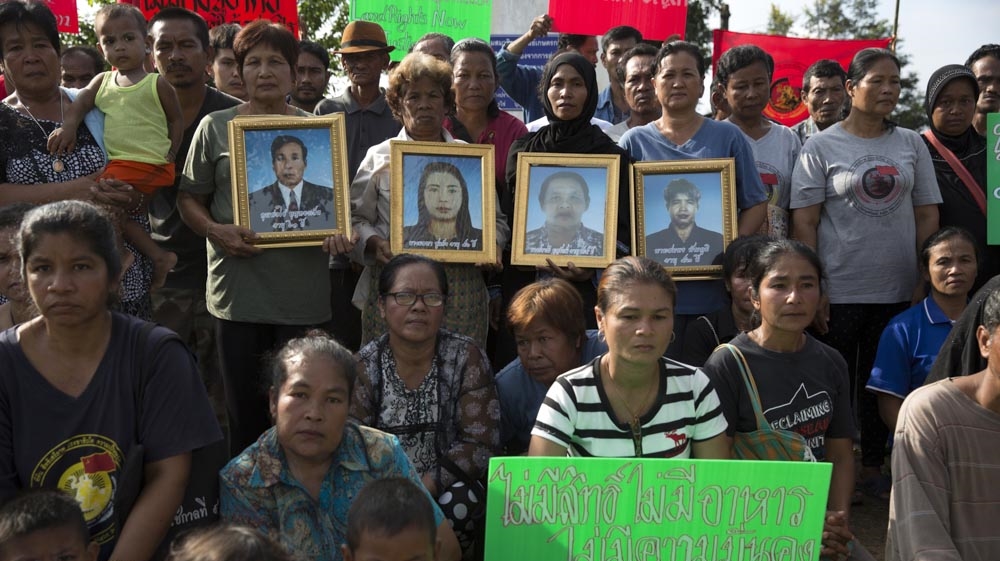 |
| Members of Klong Sai Pattana community gather during their annual memorial day. Events such as this help the communities cope with their situations by eliminating the feeling that they are not alone in the struggle. They remember the four people killed during their prolonged struggle against a palm oil company [Luke Duggleby/Al Jazeera] |
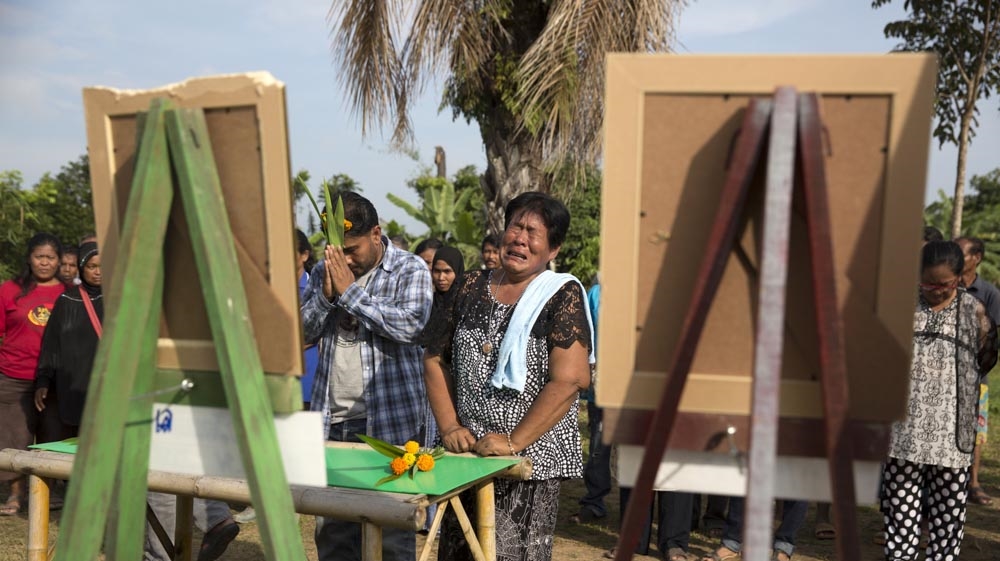 |
| Use Suwannaphat, wife of the fourth victim, Mr Chai Bunthonglek, cries during their annual memorial day. They remember the four people killed during their prolonged struggle against a palm oil company [Luke Duggleby/Al Jazeera] |





No comments:
Post a Comment